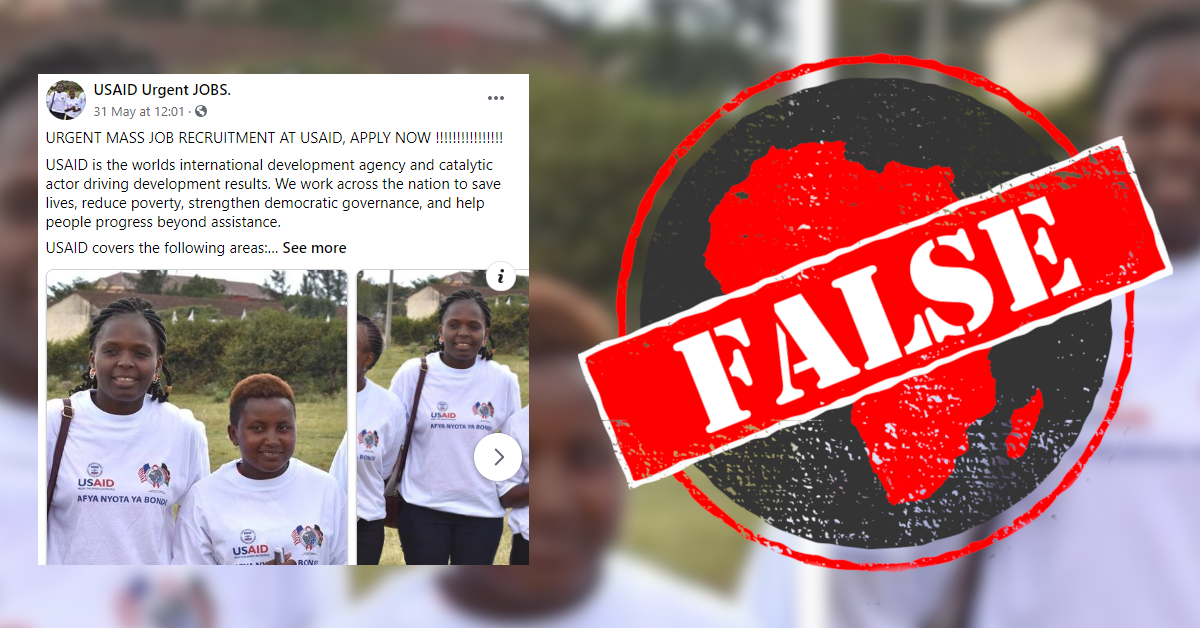“URGENT MASS JOB RECRUITMENT AT USAID, APPLY NOW!!!!!!!!!!!!!!!!” That’s the screaming headline of a post on the Facebook page “USAID Urgent JOBS”.
The post, from 31 May 2020, claims USAid – the US Agency for International Development – is hiring “300 people per ward in every county” in Kenya for a relief food programme during the Covid-19 outbreak.
“During this covid-19 period, We are planning to distribute relief food to the poor and vulnerable across all the 47 counties in Kenya,” it reads. “Before we kick off the process of food distribution, we are looking for volunteers who will help us in data collection and information about the living standards of people by filling questionnaires in every ward per county across the country.”
Successful candidates are promised a daily wage of KSh2,300 to KSh3,300.
The post links to a page on the site USAid2020jobs.org where job seekers can apply. But the link is broken, and the site’s home page only offers “Kenyan hoodie designs” for sale.
Is USAid conducting “urgent mass recruitment”?

A few comments on the post dismiss it as the work of “scammers”, but many more users have posted their location and phone numbers.
Africa Check asked USAid Kenya about the post.
“The Facebook post and page is fake,” Irene Angwenyi, a development outreach and communications specialist at USAid, told us. “USAid is not undertaking a massive job recruitment exercise.”
She added: “All USAid jobs are posted on www.myjobsinkenya.com.”
In January, February and April 2020 Africa Check exposed similar scams offering jobs at USAid. – Grace Gichuhi
The post, from 31 May 2020, claims USAid – the US Agency for International Development – is hiring “300 people per ward in every county” in Kenya for a relief food programme during the Covid-19 outbreak.
“During this covid-19 period, We are planning to distribute relief food to the poor and vulnerable across all the 47 counties in Kenya,” it reads. “Before we kick off the process of food distribution, we are looking for volunteers who will help us in data collection and information about the living standards of people by filling questionnaires in every ward per county across the country.”
Successful candidates are promised a daily wage of KSh2,300 to KSh3,300.
The post links to a page on the site USAid2020jobs.org where job seekers can apply. But the link is broken, and the site’s home page only offers “Kenyan hoodie designs” for sale.
Is USAid conducting “urgent mass recruitment”?

‘Page and post fake’
A few comments on the post dismiss it as the work of “scammers”, but many more users have posted their location and phone numbers.
Africa Check asked USAid Kenya about the post.
“The Facebook post and page is fake,” Irene Angwenyi, a development outreach and communications specialist at USAid, told us. “USAid is not undertaking a massive job recruitment exercise.”
She added: “All USAid jobs are posted on www.myjobsinkenya.com.”
In January, February and April 2020 Africa Check exposed similar scams offering jobs at USAid. – Grace Gichuhi
Republish our content for free
For publishers: what to do if your post is rated false
A fact-checker has rated your Facebook or Instagram post as “false”, “altered”, “partly false” or “missing context”. This could have serious consequences. What do you do?
Click on our guide for the steps you should follow.
Publishers guideAfrica Check teams up with Facebook
Africa Check is a partner in Meta's third-party fact-checking programme to help stop the spread of false information on social media.
The content we rate as “false” will be downgraded on Facebook and Instagram. This means fewer people will see it.
You can also help identify false information on Facebook. This guide explains how.


Add new comment